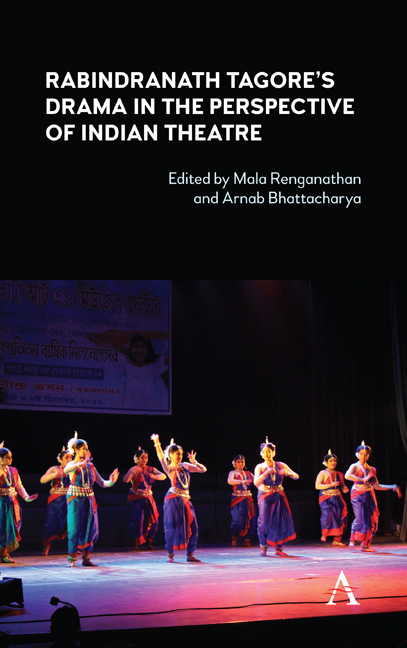Chapter 7 - The Unrealized Theatre of Tagore
Published online by Cambridge University Press: 20 January 2022
Summary
Since Tagore's demise, but especially since the 1950s, the term ‘Tagore Drama’ is being used as a kind of brand name – indeed, almost as a genre – by theatre people and others all over India, and especially in Bengal. Undoubtedly this had started as an attempt by the literati to recognize Tagore's originality and greatness as a playwright; but this rather dubious distinction has resulted in a general assumption that Tagore's plays are uniform in character and style, and to know one kind (even a hypothetical kind) is to know how to embody Tagore's vision of the theatre. The other downside of this assumption is that the so-called Indian playwrights like the late Girish Karnad, who used to reveal inconceivable depths of ineptitude in dramaturgy, had publicly branded Tagore's plays as ‘unbearable’ (without knowing a word of Bengali, of course).
Contrary to such popular notions, there is no single dramatic genre called ‘Tagore Drama’, just as there is no definitive form of dance that we may call ‘Tagore Dance’, although both the terms are in standard use – surprisingly, even in official academics. Tagore had willingly absorbed much from such diverse authors as Shakespeare, Wilde and Maeterlinck, and wrote operatic, historical, symbolic and radio plays, as well as comedies and melodrama intended for the professional stage. His final theatrical statement was probably the dance drama – a form of his own creation.
But early in his career he had also written Rangamancha (The Stage, 1902) – his famous tirade against the illusion-oriented Western theatre. There he had put up a strong case in favour of allowing free play to the spectators’ imagination while they witness the action on the stage. He had advocated an unadorned, suggestive stage setting. Some points that he made there are worth our note:
Moreover, the spectator who has come to witness your acting – does he possess not even a farthing to call his own? Is he an infant? Is it impossible to depend on him about anything as an act of faith? If it is so, tickets should never be sold to such people even for twice the price.
- Type
- Chapter
- Information
- Rabindranath Tagore's Drama in the Perspective of Indian Theatre , pp. 109 - 120Publisher: Anthem PressPrint publication year: 2020



